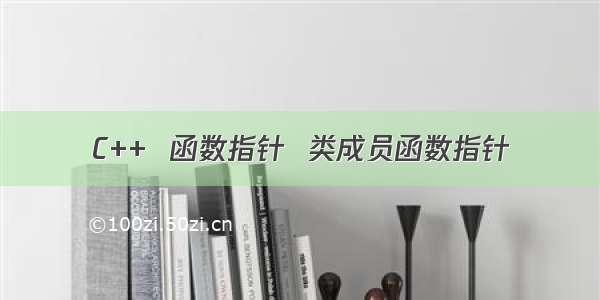
前言:
先声明一下,普通函数指针和类成员函数指针有很大的区别!所以在绑定函数的时候也会发生很多的不同的情况,本文就函数指针可能出现的各种情况一一进行分析。
测试目录:
1.普通函数指针指向普通函数 2.普通函数指向非静态成员函数 3. 类外部的 类函数指针 指向普通函数 4. 类外部的 类函数指针 指向成员函数 5. 类内部的 函数指针 指向成员函数 (类似于第2条) 6. 类内部的 函数指针 指向普通函数
#include <iostream>#include <string>#include <vector>#include <map>using namespace std;class Foo{public:string m_str;Foo(){m_str = "";}static void testFunc2(int a){cout<<"Foo:void testFunc2(int a)"<<endl;cout<<a<<endl;}void testFunc4(int a){cout<<"Foo:void testFunc4(int a)"<<endl;cout<<a<<endl;}static void testFunc5(int a){cout<<"Foo:void testFunc5(int a)"<<endl;cout<<a<<endl;}void (*pTestFunc5)(int a);void (*pTestFunc6)(int a);};void (*pTestFunc1)(int a);void (*pTestFunc2)(int a);void (Foo::*pTestFunc3)(int a);void (Foo::*pTestFunc4)(int a);void testFunc1(int a){cout<<"func1 pointer test"<<endl;cout<<a<<endl;}void testFunc3(int a){cout<<"func3 pointer test"<<endl;cout<<a<<endl;}void testFunc6(int a){cout<<"func6 pointer test"<<endl;cout<<a<<endl;}int main(int argc, const char *argv[]){Foo foo;//foo.test("woo",100);pTestFunc1 = testFunc1;//经常用这个方法(*pTestFunc1)(1);pTestFunc2=&foo.testFunc2;(*pTestFunc2)(2);//pTestFunc3 = &testFunc3; //编译器报错,不可以这么使用pTestFunc4 = &Foo::testFunc4; //初始化的时候必须带有&Foo:://pTestFunc4(4);//编译器报错,不可以这么使用//foo.pTestFunc4(4);//编译器报错,不可以这么使用//foo.*pTestFunc4(4);//编译器报错,不可以这么使用//foo.(*pTestFunc4)(4);//编译器报错,不可以这么使用(foo.*pTestFunc4)(4);//正常运行foo.pTestFunc5=&Foo::testFunc5;foo.pTestFunc5(5);foo.pTestFunc6 = &testFunc6;foo.pTestFunc6(6);return 0;}
程序分析:
1.普通函数指针指向普通函数
pTestFunc = &testFunc;
或者
pTestFunc = testFunc;
调用方式
pTestFunc(1)
(pTestFunc)(1)
(*pTestFunc)(1)
2.普通函数指向非静态成员函数
pTestFunc=foo.testFunc2; 编译器报错,提示不匹配
error: argument of type ‘void (Foo::)(int)’ does not match ‘void (*)(int)’
pTestFunc=&foo.testFunc2; 编译器报错,提示不匹配
error: ISO C++ forbids taking the address of a bound member function to form a pointer to member function. Say ‘&Foo::testFunc’
error: cannot convert ‘void (Foo::*)(int)’ to ‘void (*)(int)’ in assignment
pTestFunc=Foo::testFunc2; 编译器报错
error: invalid use of non-static member function ‘void Foo::testFunc(int)’
pTestFunc=&Foo::testFunc2; 编译器报错
error: cannot convert ‘void (Foo::*)(int)’ to ‘void (*)(int)’ in assignment
普通函数指向静态成员函数
将代码更改一下后,将成员函数前加入一个static关键字
则下面的初始化方式编译和运行正常
pTestFunc2=Foo::testFunc2;
pTestFunc2=&Foo::testFunc2;
pTestFunc2=foo.testFunc2;
pTestFunc2=&foo.testFunc2;
调用方式和普通函数指向普通函数一致
pTestFunc2(2)
(pTestFunc)2(2)
(*pTestFunc)2(2)
3. 类外部的 类函数指针 指向普通函数
这种用法就是错误的,所以编译器不通过
pTestFunc3 = testFunc3; 编译器报错,
test5.cpp:83: error: cannot convert ‘void(int)’ to ‘void (Foo::*)(int)’ in assignmen
pTestFunc3 = &testFunc3;
test5.cpp:83: error: cannot convert ‘void (*)(int)’ to ‘void (Foo::*)(int)’ in assignmen
4. 类外部的 类函数指针 指向成员函数
初始化指针的方式
pTestFunc4 = &Foo::testFunc4; //初始化的时候必须带有&Foo::
pTestFunc4 = Foo::testFunc4; //编译器报错
pTestFunc4 = foo.testFunc4; //编译器报错
pTestFunc4 = &foo.testFunc4; //编译器报错
调用方式:
pTestFunc4(4);//编译器报错,不可以这么使用
foo.pTestFunc4(4);//编译器报错,不可以这么使用
foo.*pTestFunc4(4);//编译器报错,不可以这么使用
foo.(*pTestFunc4)(4);//编译器报错,不可以这么使用
(foo.*pTestFunc4)(4)//正常运行,所以必须要带有括号
如果foo为指针
Foo *foo=new Foo();
(foo->*pTestFunc4)(4)
5. 类内部的 函数指针 指向成员函数 (类似于第2条)
foo.pTestFunc5=foo.testFunc5; 编译器报错
test5.cpp:125: error: argument of type ‘void (Foo::)(int)’ does not match ‘void (*)(int)’
foo.pTestFunc5=&foo.testFunc5; 编译器报错
test5.cpp:123: error: ISO C++ forbids taking the address of a bound member function to form a pointer to member function. Say ‘&Foo::testFunc’
test5.cpp:123: error: cannot convert ‘void (Foo::*)(int)’ to ‘void (*)(int)’ in assignment
foo.pTestFunc5=Foo::testFunc5;编译器报错
foo.pTestFunc5=&Foo::testFunc5; 编译器报错
声明为静态函数后(与第2条相似),编译和运行都OK
foo.pTestFunc5=foo.testFunc5;
foo.pTestFunc5=&foo.testFunc5;
foo.pTestFunc5=Foo::testFunc5;
foo.pTestFunc6=&Foo::testFunc5;
6. 类内部的 函数指针 指向普通函数
编译和运行都OK
foo.pTestFunc2=testFunc6;
foo.pTestFunc2=&testFunc6;
转自:/maojudong/article/details/8194143
















